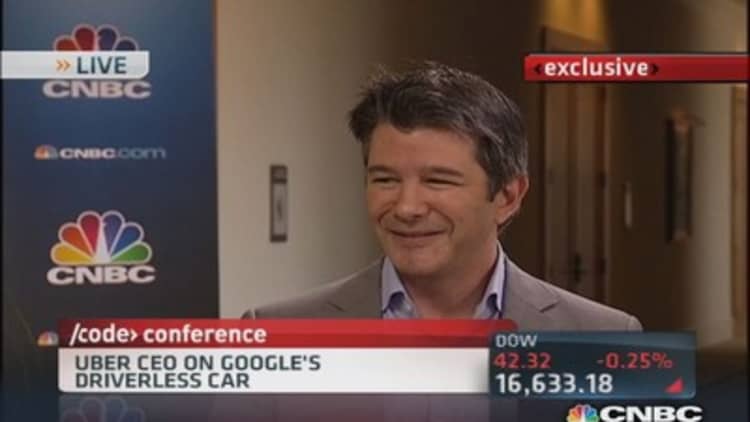Car service app Uber has built a sizable business, and hasn't been too concerned about state and city regulations. But Tuesday in Sacramento, California, legislators are discussing the possibility of clamping down on the growing business.
And it's not just Uber that is in the crosshairs of California regulators. Lyft, Rideshare and other competitors to the traditional taxi business may be asked to disclose more information about drivers, vehicles and insurance.
It's a brewing battle that pits several driving app companies against the entrenched interests of cab companies, city car regulators and state and local politicians.
Consumers seem to be voting with their smartphones and wallets, as Uber and other ridesharing apps have cut into cab companies market share.
Uber's success is radically disrupting the face of the transportation industry in California, and the tension is palpable.
In Sacramento Tuesday, members of California's legislature were threatening to prevent Uber, Lyft and others from picking up or delivering passengers from area airports.
Read MoreWhy Uber's $17 billion valuation is justified
Among the issues on the table for officials is a bill that would require more rigorous background checks of drivers, and potentially drug tests.
(One bill was approved by a committee that would raise insurance requirements for rideshare companies.)

California lawmakers are also seeking new rules that would force rideshare companies to be clearly marked like all other taxes. Lawmakers are also pushing for all rideshare drivers to carry commercial insurance at all times.
Uber, in a statement to CNBC, disagrees with the move to force its drivers to hold commercial insurance, saying that "Insurance corporations, trial lawyers, and mega-taxicab companies are determined to do anything they can to resist change and pass laws that will only benefit the status quo at the expense of consumers and drivers."
As tensions rise in California, in Seattle, Washington, Mayor Ed Murray struck a deal with Uber and Lyft on Monday. That agreement still must be approved by the Seattle City Council.
And while the spat between Uber, cab companies and state regulators is out in the open in California, several Silicon Valley investors have a different view. Investors in Uber and Lyft tell CNBC that Uber's business model is bound to ruffle some feathers and upset entrenched interests.
Read MoreUber should play by the rules, say critics
Uber called the two pending bills in the California State Senate as "backed by insurance companies, trial lawyers and cab companies and do nothing to improve safety. They are simply thinly veiled attempts to end ridesharing in the state, and will only limit consumer choice and result in less income opportunity for drivers throughout the state."
Uber's success in the marketplace and flood of high-profile investors has led to the company reaching a current valuation of close to $18 billion. That's more than the market cap of both Hertz and Avis, combined.
And Silicon Valley investors add that as long as consumers and drivers are satisfied with Uber and other ridesharing services, then they believe that these companies will ultimately triumph over threats by state or city regulators, or other special interests and lobbyists.
—By CNBC's Mark Berniker. Justin Solomon contributed reporting.



